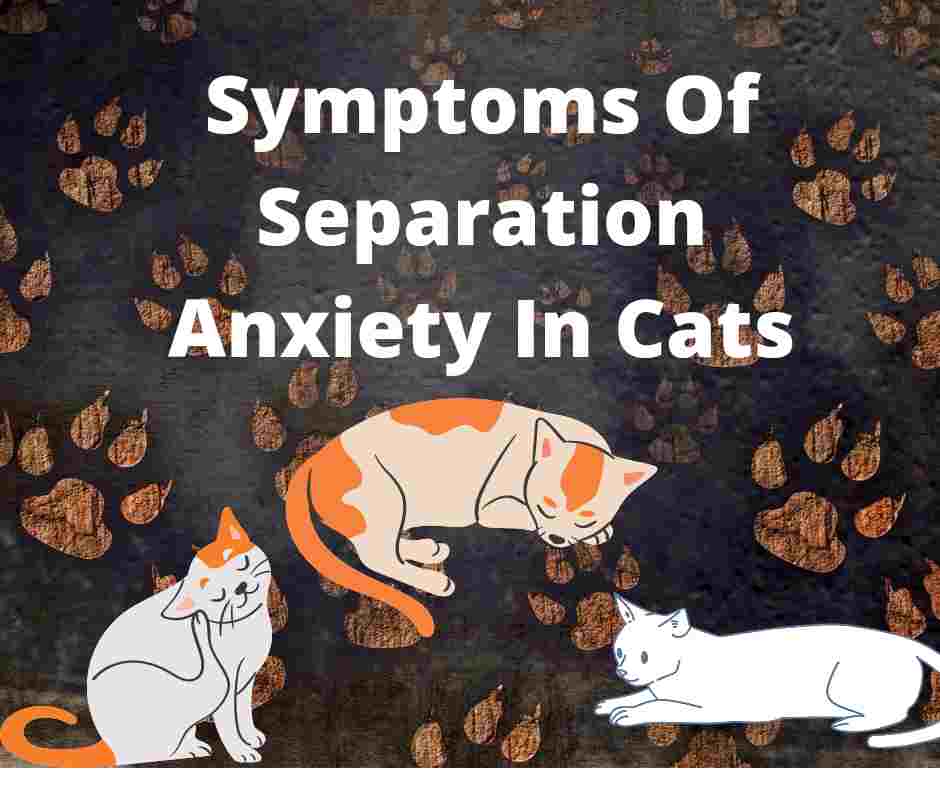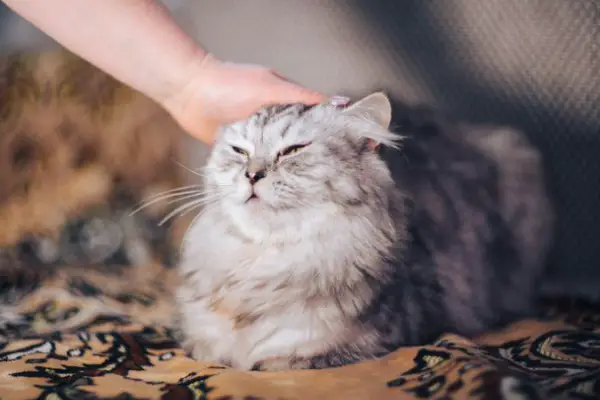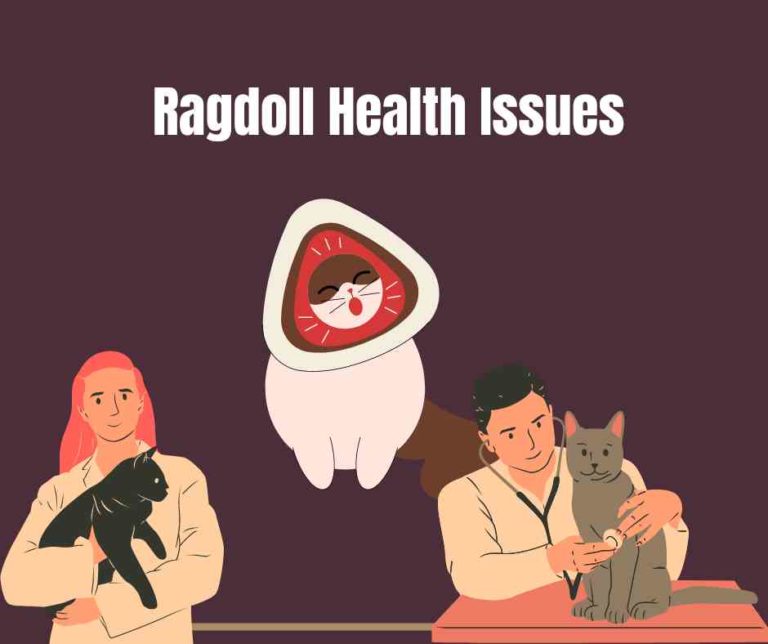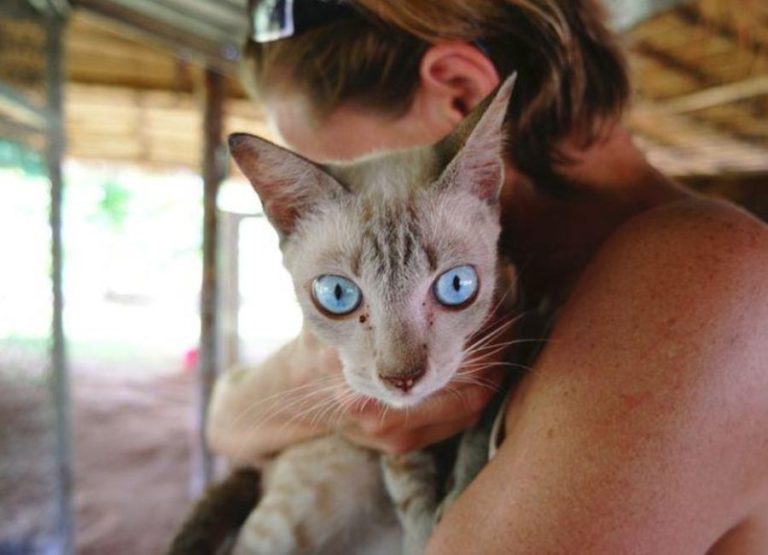15 Symptoms Of Separation Anxiety In Cats & 10 Causes

As a cat lover and owner, I took my time to study some symptoms of separation anxiety in cats and came up with this post.
People say cats are not prone to separation anxiety when compared to dogs, that is a lie, it sometimes depends on the breed of cat.
If you think cats are not prone to separation anxiety, then get a Bengal cat or Siamese cat and keep them at home alone for too long.
Note: most of the signs you see here may not be directly pointing to separation anxiety but have one or two things to do with separation anxiety.
Symptoms Of Separation Anxiety In Cats
Here are all the common symptoms of separation anxiety in cats you should know and look out for:
House-soiling and Destructive behavior by the cat
The soiling of your house is a clear indication that your cat is bored or too lonely to a point that the cat has nothing else to do.
This means your cat feels frustrated and becomes destructive with everything around and starts pushing things down.
Cutting or chewing the papers at home is a clear sign your cat is battling with frustration, which can be attributed to separation anxiety.
Anytime you come home and notice your cat soiled your home don’t blame the cat because it’s your fault.
The cat is constantly trying to get attention
A cat that is constantly seeking attention is clearly passing a message telling you that you are not giving your best.
When a cat keeps meowing or following you around unnecessarily it means the cat needs attention.
Most of the time your cat begs for the attention it could be due to the fact they feel lonely and frustrated.
Therefore anytime you notice your cat is constantly begging for your attention you need to make out more time to be with your cat.
Cat showing usual hiding behaviors
When your cat starts to show usual hiding behavior, then something is wrong with your cat.
It could be that your cat is depressed, stressed out, or frustrated, it could also mean your cat is not getting the right attention from you.
This could also mean your cat no longer trusts you or your cat no longer feel safe in your house.
Usual hiding behavior could also mean your cat is sick, so try to figure out why your cat is hiding.
Seek the help of a Veterinarian if your cat is not sick then sick the help of an animal behaviorist.
The cat constant refusal to use litter boxes
Elimination outside the litter box could not just be a sign of separation anxiety but also a sign of stress.
Depression and frustration can push your cat to not use the litter boxes, this could also be a sign of illness.
It could also be a traumatized cat symptom, but the most important thing to note is that you should not ignore it.
You can only associate refusal to use the litter box to separation anxiety when you’re sure you leave your cat alone at home for too long.
Or when you’re sure your cat is not sick or has a medication side effect.
The cat constantly attempting to escape
Attempting to escape means something is not right with your cat, it’s either your cat feels unsafe or there is too much stress around.
Most breeds of cats are very active and love exploring their environment, when you constantly leave your cat alone, your cat can get depressed.
As a result of depression, your cat will look for a way to escape.
Your cat may also want to escape if you do no neuter your cat, which means when the cat is on heat, escaping is the next option.
Therefore, constantly attempting to escape can be linked to the development of separation anxiety in cats.
There are many ways on how to stop a cat from wanting to go outside and many reasons why you shouldn’t let your cat go outside without your supervision.
Unnecessary excessive meowing by cat
Every time your cat meow is for a reason because, from my years of living with a cat, they don’t meow in vain.
When a cat feels bored, depressed, or frustrated, they have a higher tone of voice and keeps complaining.
Excessive vocalization is a strong sign of separation anxiety depending on how you care for your cat.
Meowing loudly could also be associated with pains or illness, but if you’re sure your cat is fine then consider spending more time with your cat.
Cat attempting to attack owner unnecessarily
Attempting to attack you every time you want to leave home is a strong sign of separation anxiety and should not be ignored.
Cat breeds like Bengal cats should not be left alone as they have a reputation for attacking their owners, which is while they are not legal in some states.
Therefore, attempting to attack you or holding on to you when you are leaving home should not be ignored.
Cat constantly chewing of cables or wire cords
This is a big challenge to some cat owners, when cats get bored or lonely, they simply chew on everything.
Ignoring their toys to chew on cables shows the extent of depression or frustration, and they can attack you.
The only reason this happens is separation anxiety, depression, frustration, and stress, do not ignore it as it can become a problem over time.
Unnecessary biting or nipping by cat
At this stage, the cat is already battling separation anxiety and needs your help, or the cat can attack you.
When your cat keeps nipping on your feet while you are about to leave, do not ignore the cat, if you do you are calling for unwanted behaviors.
Biting and nipping can also be associated with depression, stress, frustration, and lack of attention.
Cat refusal to use scratch post and constantly scratching furniture
When a cat refuses to use the scratch post and keeps scratching your furniture, you need to see a veterinarian or an animal behaviorist.
Not just separation anxiety, there are other reasons your cat can stop using the scratch post you provide.
Some of the reasons are stress, depression, frustration, traumatic experience, illness, dirty litter box, and more.
All this can be corrected before things get too bad that you may spend more money on the Vet.
Increased aggression and territorial behavior by the cat
When a cat starts showing too much aggression over its spot, consider taking the cat to an animal behaviorist.
That is why it is good to socialize your cat, with both humans and other pets.
So when your cat no longer plays with you or welcomes you as usual, then something is going on with your cat and this can be anxiety.
Loss of appetite and obsessive behaviors
Eating too fast or not eating at all can be associated with separation anxiety in any breed of cat.
Each time you get home then upon feeding your cat, you notice your cat starts eating faster than usual, something is wrong.
It could be that your cat is hungry, or it can also be out of depression or frustration, therefore you should not overlook it.
Inappropriate or unnecessary urination by the cat
This can be a sign of separation anxiety or a sign of illness, however, if you are very sure your cat is healthy then you should consider separation anxiety.
A cat that is suffering or going through separation anxiety is always known to pee any and everywhere.
When it comes to peeing outside the litter box, things are becoming more serious, and you need to see your vet.
Clingy or possessive behavior by the cat
Some clingy behavior, such as following their owner from room to room, and being possessive with their owners is a clear sign of separation anxiety.
Whenever you come back from work or anywhere and your cat starts to follow you up and down, then the cat needs more of you around.
Causes of separation anxiety in cats
Here are all the common causes of separation anxiety in cats you should know and be careful of:
- The cat grew up as an orphaned kitten
- Leaving cat alone at home for too long
- Lack of constant companionship and care
- A change in the people around
- The sudden loss of a loved one
- Genetic factors
- Environment not being secure enough
- Moving to a new home
- Depression and too much stress
- Having a newborn baby
- Frustration
How to prevent separation anxiety in cats
Here are some common ways to prevent separation anxiety in cats:
- Provide plenty of cuddles and playtime once you get home
- Provide enrichment activities
- Get another companion pet
- Desensitize anxiety triggers
- Ensure enough playtime
- Practice shorter absences first
- Provide a safe and stimulating environment
- Monitor your cat movement outside your house using cameras
- Provide a window view of the outside world
- Invest more in puzzle feeders, toys, and pet cameras
- Hire a pet sitter
- Keep your daily departures low-key
- Encourage independence living for your cat.
How to diagnose separation anxiety in cats
Because the symptoms of separation anxiety might also be signs of other health problems.
Diagnosing any mental disease generally starts with a thorough medical examination to rule out any physiological issues.
This procedure starts with a physical examination that includes lab tests including blood and urine tests.
Your veterinarian will then ask you detailed questions about your cat’s behavior.
A video of your cat’s behavior when they’re alone at home might help you figure out what’s wrong.


![How Do You Know If Your Cat Has Rabies [9 Hints] How Do You Know If Your Cat Has Rabies](https://petcreeks.com/wp-content/uploads/2023/04/How-Do-You-Know-If-Your-Cat-Has-Rabies-768x555.jpg)
![Cat Lethargic Not Eating or Drinking [Reasons] Cat Lethargic Not Eating or Drinking](https://petcreeks.com/wp-content/uploads/2023/02/Cat-Lethargic-Not-Eating-or-Drinking-768x555.jpg)


